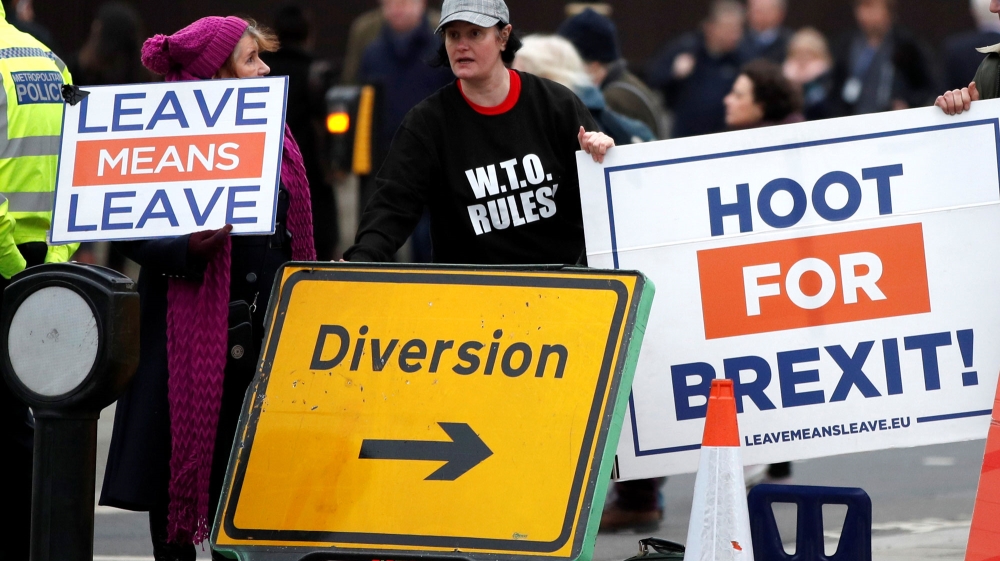Fears of ‘Windrush-type scandal’ as EU citizen registration opens
A government scheme designed to allow European citizens to continue living in the UK after Brexit was launched in public test phase on Monday, amid warnings that it could leave tens of thousands of people undocumented in years to come.
The 3.5 million citizens of the EU’s 27 countries residing in the UK must go through an online application process to apply for “settled status” if they have lived in the UK for at least five years, or “pre-settled status” if they haven’t reached that threshold.
The scheme will be fully opened by March 30.
By July 2021, it will become mandatory for EU citizens living in the UK to hold settled or pre-settled status. That deadline would become the end of 2020 should the UK exit the EU without a deal.
A report released today by the think-tank British Future warns of a new “Windrush-type scandal” unless the government addresses potential pitfalls in the system, steps up its information campaign and pays particular attention to vulnerable cases including the elderly and those with patchy employment and residence histories.
“The Home Office must invest in getting the EU Settlement Scheme right from the start. Failure to do so could cause massive problems in years to come, on a far bigger scale than the ‘Windrush scandal’,” said Jill Rutter, director of Strategy for British Future and co-author of the report, referring to the denial of health services, detention and in some cases deportation of Commonwealth citizens after they were retroactively asked to prove their right to reside in the UK.
“The application system should work simply and efficiently for the vast majority of EU citizens. But there will always be more complex cases where people find it harder to navigate the system or to prove their residency – and the sheer scale of this task means even a low rate of failure equates to tens of thousands of people,” Rutter said.
Even if they say we shouldn’t worry, they won’t give it to everyone. You still have to apply.
Kristina, Slovakian citizen who has been living in the UK for 10 years
The report points out that if only five percent of those eligible either struggled to apply or were unjustly rejected, that would equal 175,000 people. In order to process all applications before the deadline, the Home Office would have to process 5,600 applications each working day.
The scheme will cost the British government between 500 million British pounds and 600 million pounds, while it will raise 170-190 million in revenue. The application costs 65 pounds for adults and 32.50 for children.
The British government has made a point of reassuring EU citizens that its default position will be to grant rather than deny settled status.
“I couldn’t be clearer: EU citizens living lawfully in the UK today will be able to stay,” Theresa May wrote in an open letter to EU citizens back in October 2017.
The UK government assured EU citizens they will still be able to apply for the settlement scheme should a no-deal scenario materialise.
However, there would be no transition period in which free movement rights would be guaranteed and applicants would have to be in the UK by Brexit day, currently March 29, in order to be eligible.
Critics have said that no deal could leave EU citizens vulnerable to discrimination from employers and landlords who are asked to do stringent checks before hiring or renting out a home.
 |
| Pro-Brexit protesters demonstrate outside the houses of Parliament [John Sibley/Reuters] |
Despite promises, many fear for their future.
Kristina (not her real name), 30, moved to the UK from Slovakia 10 years ago. She is married to a British citizen and has two British children, but she must still apply for settled status to remain in the UK after Brexit, and she’s worried she may not get it.
“Even if they say we shouldn’t worry, they won’t give it to everyone. You still have to apply,” Kristina told Al Jazeera.
Kristina, who worked for a catering agency when she first arrived in the UK, became a full-time carer in 2012 after her husband was diagnosed with cancer and her two children with autism.
Now, she is concerned that gaps in her employment history will leave her unable to prove she has been “exercising treaty rights” – to be working, studying or self-sufficient according to EU free movement rules – throughout her stay in Britain.
Her husband does not currently meet the income requirements set for British citizens to sponsor their spouses in the UK.
“In the rules they published, they added a provision that says that home office caseworkers, if they decide that the person can be removed for not exercising treaty rights, they also have to refuse the settled status application,” Chai Patel, legal policy director at the Joint Council for the Welfare of Immigrants (JCWI) told Al Jazeera.
“We don’t know who is going to be affected, it would depend on how home office caseworkers choose to apply those rules,” Patel added.
Other groups at risk include the Roma and homeless EU citizens living in temporary accommodation.
The government said the first two private test phases of the scheme had been successful. The second test phase, open to selected universities and health bodies, saw 29,987 applications submitted from November 1 to December 21, 2018. Some 27,211 decisions had been issued by January 14, with no cases refused.
The remaining 3,000 were still awaiting a decision due to their application being incomplete or needing further evidence.
“All the debates around settled status and the capacity of people to secure their position imply an ideal kind of person [that would qualify], but all the people that are not thought about may struggle with the application,” Nando Sigona, who teaches international migration at the University of Birmingham, told Al Jazeera, “there is still a sense of uncertainty about what’s going on.”




